- Home
- R. A. Spratt
The Final Mission
The Final Mission Read online
About the Book
With a team of international super spies hunting them down, The Peski Kids’ orders are simple – act normal. But for Joe, Fin, April and Loretta that mission is impossible.
Tensions run high when their mum moves in and starts spotting enemy agents behind every corner in Currawong. Should The Peski Kids get out of town? Of course they should! But they’re not going to. Not when there’s a potato festival to celebrate.
Contents
Cover
About the Book
Title Page
Dedication
Prologue
Chapter 1: TIME TO DECIDE
Chapter 2: THE NEW NORMAL
Chapter 3: WHAT WAS THAT?
Chapter 4: DIVERSION
Chapter 5: SCONES
Chapter 6: THE CHALLENGE
Chapter 7: BACK AT HOME
Chapter 8: PROGNOSIS
Chapter 9: THE LIST
Chapter 10: RESURRECTION
Chapter 11: THE NAMES
Chapter 12: THE PAPER
Chapter 13: FERDINAND
Chapter 14: SOMETHING GOING ON
Chapter 15: NO ESCAPE
Chapter 16: THE NEW TEACHER
Chapter 17: SHOWDOWN
Chapter 18: THE SACK
Chapter 19: THE FIRST TRAINING SESSION
Chapter 20: QUESTIONS
Chapter 21: FIN HAS A PLAN
Chapter 22: UNDISCLOSED LOCATION
Chapter 23: DEMOCRACY
Chapter 24: THINGS THAT GO BUMP IN THE NIGHT
Chapter 25: CAPTURE THE POTATO
Chapter 26: THE PARADE
Chapter 27: ANTICIPATION
Chapter 28: HAPPILY EVER AFTER
About the Author
Books by R. A. Spratt
Collect Them All . . . The Peski Kids
Friday Barnes
Nanny Piggins
Imprint
Read more at Penguin Books Australia
To Angus
‘. . . Ms Borg may stay in the country while her application for permanent residency is processed, on the condition that she marries Mr Peski right now.’
‘Right now!’ exclaimed April.
‘What does that mean exactly?’ asked Dad.
‘Today,’ clarified Ms Klaus. ‘I did an online celebrants course. I can do it myself. It will take about three minutes.’
‘Gosh,’ said Dad.
‘This is lovely,’ said Loretta. ‘You have such a beautiful garden, Mr Peski. It is the perfect setting for a wedding.’
‘I’ll go into town and find a hotel,’ said Mum. ‘I don’t want to intrude.’
‘You can’t just leave us again!’ exclaimed April. ‘You just got back.’ Her face had gone bright red, like she hadn’t decided whether she was going to cry or punch someone. Probably, knowing April, it would end up being both.
‘Besides, this is Currawong,’ said Fin. ‘There are no hotels.’
‘It’s true. There’s just Mrs Shahani’s Airbnb,’ said Loretta. ‘But it’s not really a proper bnb. It’s just a futon in her garage. You’ll be sleeping next to her Mitsubishi Mirage.’
Mum wasn’t pretending to be a bumbling academic any more, but she didn’t look like a ruthless operative either. ‘It’s been eleven years, Harold,’ said Mum. ‘I know you’ve moved on. In the prison, they showed me photographs, they told me about your upcoming wedding.’
Dad turned to Ingrid. She was staring at him, in that unnerving way that made him so uncomfortable, but somewhere along the way he had become comfortable with the way she made him uncomfortable. ‘Well, yes,’ Dad said. ‘Ingrid is my betrothed. I have made a commitment. We are going to get married.’
‘NO!’ said Ingrid. It was shocking. She had raised the volume of her voice, which is something she had never done before. ‘This cannot go on. I cannot live a lie.’
‘Really,’ said Mum. ‘In our line of work, it’s kind of a professional requirement.’
‘You lied for years about not being able to speak English,’ Fin reminded her.
‘But this is a big lie,’ said Ingrid. ‘I cannot marry you, Harold.’
‘Oh,’ said Dad. He didn’t know how to react. He was terrified of Ingrid, but he had been getting used to the idea of having to live with her for the rest of his life. She had made him feel safe.
‘It’s the saggy brown dressing-gown, isn’t it,’ said Loretta with a sigh. ‘We all love you, Mr Peski, but there are some things a woman can’t overlook.’
‘No, it is not Mr Peski’s ugly clothes, or weak personality or shameful cowardice,’ said Ingrid. ‘I grow to like, even respect him, even with all this.’
‘Ooooh,’ said Loretta. She hugged April’s arm. ‘This is so romantic.’
‘Harold, I cannot marry you,’ said Ingrid. ‘Because . . . I love another.’
‘Then you’re going to have to come with me,’ said the immigration officer, taking a pair of handcuffs from his belt.
Ingrid shook her head. ‘I’m afraid I am not going to agree to that either.’ She clenched her fists.
Then suddenly every sprinkler in Dad’s garden came on simultaneously. The immigration officials yelped with shock. The water was cold. And it wasn’t tap water. It was Dad’s special irrigation blend. It was pre-mixed with manure and smelled really really bad.
‘Run!’ yelled Joe. He was standing by the tap, the faucet still in his hand.
Ingrid ran.
‘We need to get out of here, now,’ said Mum. ‘This debacle will send up red flags online. Our security has been compromised. We’re not safe here any more.’
Mum was watching the immigration vehicles pull out from the end of the driveway. A couple of them had tried chasing Ingrid on foot, but they were not an athletic bunch. They soon hurried back to speed after her in their cars.
Joe, Fin, April, Loretta and Dad were preoccupied with cleaning themselves up. They were still covered in manure-laced water.
‘We’re not going anywhere,’ said April. ‘I need a shower. I smell worse than Joe’s feet. Pumpkin, get off!’ Pumpkin was rubbing his face lovingly on April’s soggy sock.
‘I quite like the smell,’ said Dad, sniffing his own shirt. ‘It’s the smell of spring in the garden.’
‘Spring in the garden after a flock of chooks has pooped all over everything,’ said April.
‘You’re not listening. You all need to pack a bag now,’ said Mum. ‘We need to leave this building in less than three minutes. If our cover is blown, there could be helicopters on the way here already.’
‘No!’ said Joe, firmly. This caught everyone’s attention. He was so rarely adamant about anything. ‘This isn’t a b-b-building. It’s our h-home.’
‘Technically it is a building,’ said Fin. ‘It would be more accurate to say, this is more than a building, it is our home.’
April whacked Fin with the back of her hand. ‘Stop being pedantic when Joe is trying to be profound.’
‘Besides, Mrs Peski, you have to be reasonable,’ said Loretta. ‘This isn’t a good time of year to travel. There are too many tourists in Europe, and Brazil is no fun when it’s cold.’
‘You don’t understand the seriousness of this situation. Your lives are in jeopardy,’ said Mum. ‘The Kolektiv probably already know you’re here.’
‘Pah,’ said April. ‘I’m not worried about the Kolektiv. It’s Professor Maynard I don’t trust.’
‘She could be on her way too,’ said Mum. ‘We can get to the coast by nightfall. I’ve got enough cash to bribe our way onto a container ship bound for South America. Once we get to Chile, we can make our way across country to the Amazon jungle. I know a tribe who will give us shelter. No one will ever find us.’
‘Nup,’ s
aid Fin. ‘I’ve got a history assignment due tomorrow. I’ve been working on it for weeks. I’m handing it in.’
‘Yeah, and I’ve just been made captain of the school rugby team,’ said April. ‘I’ve got responsibilities. Those drongos need me.’
‘And I l-l-like it here,’ said Joe.
‘Harold, talk to them,’ said Mum. ‘We need to leave.’
‘No,’ said Dad. ‘We’re not going anywhere. I’m tired of living in fear.’
‘Better to live in fear than to die in fear,’ said Mum.
‘No,’ repeated Dad. ‘I’m staying. I agree with the children. If someone comes here, we’ll face that when it happens. Hopefully it won’t happen.’
‘You’re mad,’ said Mum.
‘Yes,’ agreed Dad. ‘I know.’ No one was more aware of his mental health limitations than Dad himself. ‘You can run if you want to.’
Mum turned to the children, ‘Come with me. It’s for your own good.’
‘Yeah, nah,’ said April. ‘I’m taking a shower.’ She headed for the staircase. Pumpkin scrambling along behind, trying to lick her socks.
Mum looked at Joe. He looked at the floor. He didn’t want to say anything – Mum knew what that meant.
‘Fin?’ asked Mum. ‘You’re the one who’s always logical.’
‘You’ve damaged your credibility,’ said Fin. ‘Dad may be weak and cowardly, but we know that. Whereas we found out three months ago that we don’t know you at all. Maybe it’s you we should be most afraid of.’ Fin turned and left the room too. Like Joe, he didn’t want to look his mother in the eye.
Mum and Dad were the only ones left.
‘This is a mistake,’ said Mum. ‘A terrible mistake.’
‘That’s all right,’ said Dad. ‘While you were away we got used to making lots of those.’
There was an uncomfortable silence in the kitchen the next morning as Joe, Fin, April and Loretta got ready for school. Even Pumpkin was quiet as he chewed on a bone. He hadn’t been given a bone, so goodness knew where he got it from.
It was strange having Mum in the house. She’d given up any pretence of being the bumbling academic they’d known before. She didn’t even look like the mum they were used to. She was lean and wiry, and intimidating.
Mum was inured to silence. It was one of the techniques the Kolektiv had used to try and break her will in prison. She barely registered the sullenness of her children. She was focused on food as she went to the fridge. It would be nice to eat something that didn’t involve pickled cabbage.
Mum was met with disappointment. ‘There’s no food.’
‘Duh,’ said April. ‘There never is. Joe hasn’t had a chance to do the shopping yet.’
‘Joe does the shopping on Monday after school,’ Fin explained. ‘So we’ve always run out of food by Monday morning and we have breakfast in town.’
‘There’s plenty of veg from the garden if you want to eat in,’ said Dad, as he entered through the French doors, carrying an armload of green leaves. ‘The kale is particularly bountiful at the moment.’
‘Oh Mr Peski,’ said Loretta. ‘Even Vlad doesn’t like kale and he’s a herbivore.’ Vlad was Loretta’s horse. He was an enormous stallion with a vile temperament who normally ate everything from regular horse feed to prize-winning roses and washing straight off the line.
‘I can’t go into town and eat in a restaurant,’ said Mum. ‘I just escaped from the Kolektiv. I’ve got to lie low.’
‘Hah!’ said April, barking out a laugh. ‘Then you shouldn’t have come to Currawong.’
‘What?’ asked Mum.
‘Everyone will know you’re here already,’ explained Fin.
‘The intelligence network in Currawong is better than any spy organisation,’ added Loretta.
‘What do you mean?’ asked Mum.
‘G-g-gossip,’ said Joe.
‘It spreads quicker than the bubonic plague in a rat-infested sewer,’ added April.
‘After breakfast you can see where we go to school,’ said Fin. He so desperately wanted Mum to be proud of him, or at least interested in him.
‘I’d like that,’ said Mum.
Fin smiled.
‘I should check that they’ve got a secure perimeter,’ said Mum.
Fin’s face fell.
Mum and Dad didn’t have bicycles and flying into town in a helicopter seemed ostentatious, so they all walked instead. Mum felt very exposed walking along a public street. It was weird being outside after all those months locked up. The countryside was nice enough, if you liked flat, square fields. But as they got closer to town, they started to come across people and that really unnerved her. Strangers waved or called out from passing cars.
‘Hello, Mrs Peski!’
‘Welcome to Currawong, Mrs Peski!’
‘Why are all these people smiling at me?’ asked Mum.
‘Ignore it,’ advised April. ‘If you smile back, you’ll only encourage them.’
Suddenly, a car squealed to a halt. Pumpkin barked wildly. Mum braced, ready to counterattack if it was the Kolektiv, but it was a perky middle-aged brunette with way too much hairspray in her bouffant hair, who leaned out of the driver’s window.
‘Mrs Peski, if you want your hair done, just pop into my salon,’ said the woman.
‘This is Sonya, Mrs Peski,’ explained Loretta. ‘She runs the hair salon in town.’
‘You don’t need an appointment,’ said Sonya, happily. ‘I know you’ve been on the road, and you’ll be desperate to dye out that grey.’
‘Actually, my name is Dr Banfield,’ said Mum.
‘I didn’t know you were a doctor,’ said Sonya. ‘Perhaps you could have a look at my bunion when you come in the salon.’
‘You don’t under . . .’ began Mum. But Sonya was already pulling away. ‘What’s wrong with these people?’ asked Mum. ‘Why are they all making eye contact and being friendly? Is there some sort of facility for the mentally impaired nearby?’
‘They’re not mentally impaired,’ said Loretta. ‘They’re nice.’
‘Puh-lease,’ said April. ‘They can be both. Although my money is still on brain damage from heavy metal poisoning in the water supply.’
Up ahead an elderly couple coming the other way crossed the street to greet them.
‘Well done, love,’ said Old Mrs Peterson, grabbing hold of Mum’s hand and squeezing it affectionately. Mum had to fight the urge not to throw the old woman over her shoulder and slam her into the ground as her training had taught her. ‘Good on you for running off that foreign chit.’
‘I beg your pardon?’ said Mum.
‘We don’t need foreigners like that here,’ said Old Mrs Peterson.
‘But I’m Jewish,’ said Mum. ‘My family emigrated from the Russian Pale. And my husband’s family is from Poland. We’re foreign too.’
‘Yes, but you’re not beautiful and young,’ said Old Mrs Peterson unperturbed. ‘They’re the worst kind, coming here and stealing our men.’
‘Have you had a bad experience, Mrs Peterson?’ asked Loretta, partly to be conversational and partly out of morbid curiosity.
‘Oh yes,’ said Mrs Peterson. ‘When I was just sixteen years old, Bjork Thorsdottir arrived in town fresh off the boat from Iceland. She stole the love of my life from me.’
‘Hey,’ said Mr Peterson. He’d been distracted by Pumpkin trying to chew his walking stick, but he’d caught the last part of the conversation. ‘I thought I was the love of your life? We’ve been married for sixty-one years.’
‘Oh, put a sock in it, Darryl,’ said Old Mrs Peterson, letting go of Mum and tucking her arm through his as they both shuffled away.
The Peskis crossed through the Daffodil Gardens and turned onto Main Street.
‘This is it,’ said Fin.
Normally Currawong looked like any other small country town, with a couple of dozen shops lining either side of their main road, but today everything looked unusual. The townspeople were decorating.
‘Must b-b-be another festival,’ said Joe.
Currawong had festivals most weekends. The locals couldn’t get enough of them. Or rather, the local small business people couldn’t get enough of them. It was how the town attracted tourists. Visitors certainly weren’t going to come for the natural beauty of the landscape and definitely not for the cultural life of the town.
‘But it looks like they’re covering the town in thousands and thousands of . . . ,’ Mum struggled to think of an appropriate word and eventually gave up, ‘. . . poops.’
‘I think you’ll find that they’re meant to be potatoes,’ said Fin.
‘Have they ever seen a potato?’ asked Mum.
‘To be fair,’ said Dad. ‘The local strain of potato, the Bronwyn Brown, does look a lot like that. It’s a very brown and tubular spud.’
‘And people eat it?!’ exclaimed Mum.
‘It’s delicious boiled, fried or baked,’ gushed Dad. ‘It is a truly versatile vegetable. And very high in fibre, so it’s good for the bowels. Round here they say, “A Bronwyn Brown a day keeps the proctologist away.”’
Dad pointed to a big brown banner hung over the Post Office that said exactly this.
‘A baseball bat would keep him away too,’ grumbled April.
‘Hurry up,’ said Joe, as he surged ahead.
They were within sniffing distance of his favourite establishment, the Good Times Cafe. The cafe itself was disgusting and grotty, but they did serve $5 egg and bacon rolls. Being six foot three and still growing, Joe loved cheap, plentiful food in all its forms. He didn’t care how much bacteria was growing behind the splashback in the kitchen, or if big flakes of ceiling paint occasionally wafted down onto your plate. He never put his egg and bacon roll down on the plate once he picked it up and started eating, so it didn’t matter.

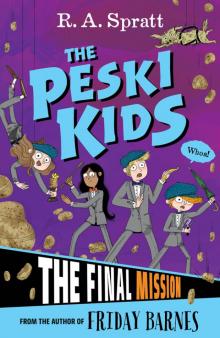 The Final Mission
The Final Mission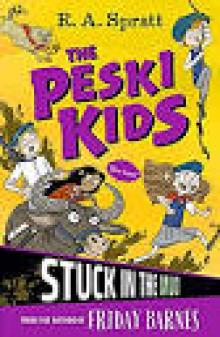 Stuck in the Mud
Stuck in the Mud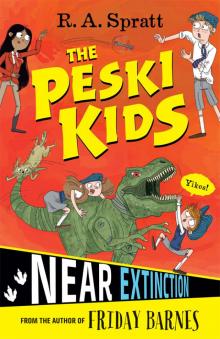 Near Extinction
Near Extinction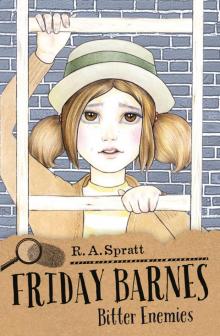 Bitter Enemies
Bitter Enemies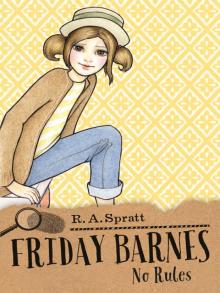 No Rules
No Rules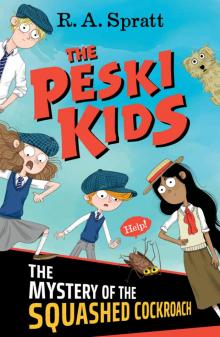 The Mystery of the Squashed Cockroach
The Mystery of the Squashed Cockroach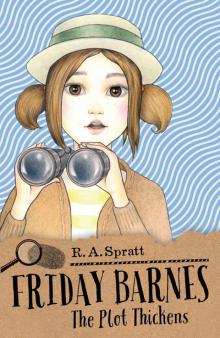 The Plot Thickens
The Plot Thickens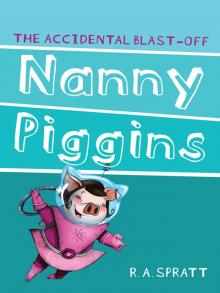 Nanny Piggins and the Accidental Blast-off
Nanny Piggins and the Accidental Blast-off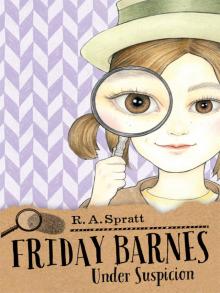 Friday Barnes 2
Friday Barnes 2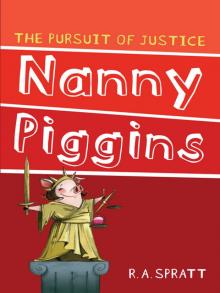 Nanny Piggins and the Pursuit of Justice
Nanny Piggins and the Pursuit of Justice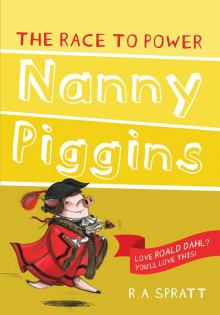 Nanny Piggins and the Race to Power 8
Nanny Piggins and the Race to Power 8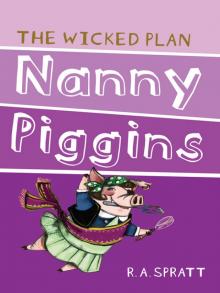 Nanny Piggins and the Wicked Plan
Nanny Piggins and the Wicked Plan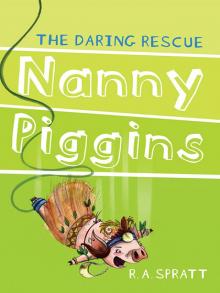 Nanny Piggins and the Daring Rescue 7
Nanny Piggins and the Daring Rescue 7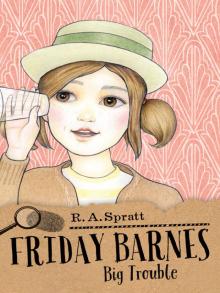 Friday Barnes 3
Friday Barnes 3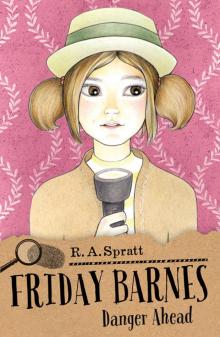 Danger Ahead
Danger Ahead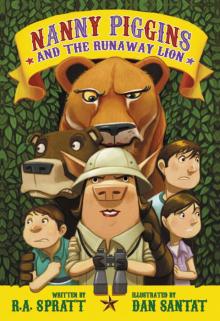 Nanny Piggins and the Runaway Lion
Nanny Piggins and the Runaway Lion The Adventures of Nanny Piggins
The Adventures of Nanny Piggins